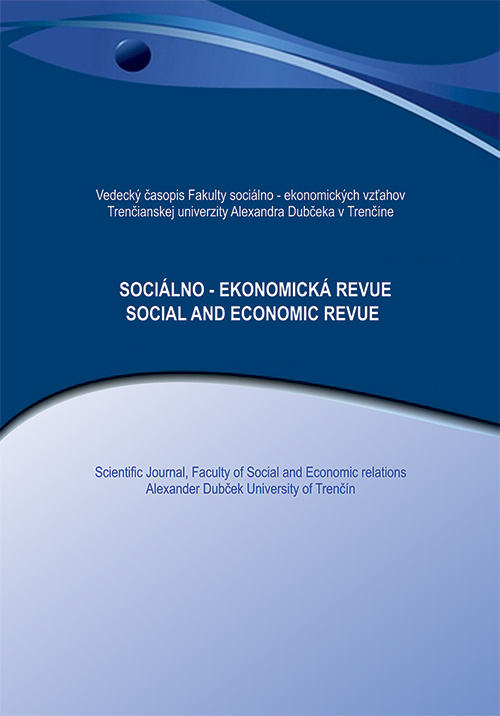EVALUATING OF ECONOMIC VIABILITY OF LOGISTICS COMPANIES
In the global economic conditions, ensuring the viability of logistics companies depends on a variety of external and internal factors that determine the need to systematically assess changes in these factors. A systematic approach to the modern interpretation of economic viability not only identifies critical factors that influence the viability of organizations, but also allows to develop an appropriate system of indicators to measure them. In order to achieve a high level of economic viability of a company, it is particularly important to apply new tools and methods that take into account not only internal but also external performance parameters. Globalization, new rules of competition and the movement of capital are creating the conditions, the need and the increasing demands for evaluation of economic viability. The need for evaluation economic viability is based on the ability of the organization to innovate, to adjust its actions and to develop the strategy, ahead of its competitors, to maintain high productivity in a long run. In this article, we have distinguished the main indicators and methods of evaluation, which are intended to assess the viability of the subject and thus to reveal the determinants of economic vitality. Relating on the theoretical analysis of factors and indicators, the evaluation model of logistics companies on evaluation of their economic viability is presented.
Release: 2019/3 Pages: 20-28 JEL classification: C40, C50, C52
DOI:
Keywords: economic viability, economic viability assessment, logistics sector, logistics companies
Section:
Contacts:
Mgr. Deimantė Karpavičienė,
Kaunas University of Technology (Lithuania),
School of Economics and Business
Gedimino st. 50, Kaunas, Lithuania.
E-mail: deimante.karpaviciene@ktu.lt
Prof. dr. Valentinas Navickas,
Alexander Dubcek University of Trencin, Department
of Management and Development of Human
Resources
Studentska 2, 911 50 Trencin
valentinas.navickas@tnuni.sk
Literature:
Avdeeva, E., Belyantseva, O., & Smorodina, E. (2018). Constituents of sustainable development potential of a logistics company (pp. 1-6). [viewed 25-03-2019]. Access through internet:
https://www.researchgate.net/publication/329231714_Constituents_of_sustainable_development_potential_of_a_logistics_company
Budrikienė, R. and Paliulytė, I. (2012). Applicability of bankruptcy prediction models to companies of different solvency and profitability. Economics and Management: Topicalities and Perspectives, 2 (26), 90-103.
Chang, Y.-W (2015). Employee Performance Appraisal in a Logistics Company. The Journal of Social Sciences, 03 (07), 47-50 [viewed 26-03-2019]. Access through internet:
https://www.researchgate.net/publication/281945746_Employee_Performance_Appraisal_in_a_Logistics_Company
Dzikevičius, A. and Jonaitienė, B. (2015). Search for financial ratios that best evaluate companies operating in different sectors of Lithuania. Business: Theory and Practice. 16 (2), 174-184.
Garbie, I. (2016). Sustainability in Manufacturing Enterprises. AG Switzerland: Springer. [viewed 24-03-2019]. Access through internet: https://www.researchgate.net/publication/314767302_Sustainability_in_Manufacturing_Enterprises
Galinienė, B. (2015). Transformations of the Property and Business Valuation System: A Monograph. Vilnius: Vilnius University Press.
Ionescu, G.-M. (2018). A Presentation of a Set of Macroeconomic Indicators to Evaluate Economic Sustainability in Romania. Business and Economics, 13 (3), 45-62 [viewed 24-03-2019]. Access through internet:
https://www.researchgate.net/publication/330567987_A_Presentation_of_a_Set_of_Macroeconomic_Indicators_to_Evaluate_the_Economic_Sustainability_in_Romania
Koleda, N., & Lace, N. (2010). Dynamic factor analysis of financial viability of Latvian service sector companies. Economics and Management, 15 (2010), 620-626.
Minalga, R. (2009). Logistics in Business: A Textbook. Vilnius: Homo liber.
Palšaitis, R. (2010). Modern Logistics: A Textbook. Vilnius: Tech.
Palšaitis, R. (2011). International Business Transport Logistics Service: A Textbook. Vilnius: Tech.
Rosha, A., & Lace, N. (2018). The Open Innovation Model of Coaching Interaction in Organizations for Sustainable Performance within the Life Cycle. Sustainability, 10 (3516), 1-17 [viewed 26-04-2019]. Access through internet:
https://www.researchgate.net/publication/328036109_The_Open_Innovation_Model_of_Coaching_Interaction_in_Organisations_for_Sustainable_Performance_within_the_Life_Cycle
Savickienė, J. (2016). Assessing the Economic Viability of Family Farms: A PhD Thesis. Alexander Stulginsky University.
Sekliuckienė, J. and Repečkienė, A. (2014). Business in Emerging Markets: A Textbook. Kaunas: Technology.
Tekin, K. E., Bitiktas, F., & Kilic, A. (2017). An Analysis of Ethical Codes of Logistics Companies. 3rd Annual International Conference on Social Sciences (AICSS). [viewed 25-03-2019]. Access through internet: https://www.researchgate.net/publication/323780027_An_Analysis_of_Ethical_Codes_of_Logistics_Companies
Vasić, M., Potkonjak, A., Stanojević, D., & Dimitrijević, M. (2015). Quality implications on the business of logistic companies. Proffesional Paper, 13 (2), 87-92 [viewed 24-03-2019]. Access through internet: https://www.researchgate.net/publication/282425842_Quality_implications_on_the_business_of_logistic_companies
Qerimi, F., Hajdar, M., & Fejza, J. (2017). Economic sustainability as a regional development factor. [viewed 24-03-2019]. Access through internet:
https://www.researchgate.net/publication/322581881_ECONOMIC_SUSTAINABILITY_AS_REGIONAL_DEVELOPMENT_FACTOR


